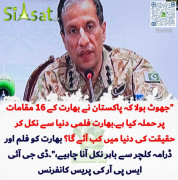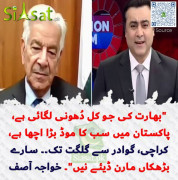A
arshad_lahore
Guest
Madressah takeover
Part II(Quantum note)
Friday, June 05, 2009
Dr Muzaffar Iqbal
There is obviously no comparison between the lofty madressahs of yesteryears and the rundown, squalid skeletons of today which are the haunts of the dispossessed. The glaring facts cannot be ignored.
On the one hand, we have the likes of the Ulugh Beg madressah, which was the world's most advanced research centre in astronomy in the fifteenth century and where a team of scholars excelled in Islamic sciences as well. Children were taught the intricacies of the texts of the Quran and the Hadith, they received all that was needed to become leaders in society. On the other hand, we have thousands of semi-literate "teachers" imparting religious education to students who come from the poorest segment of the society. The contrast is too obvious to be ignored by anyone who is serious about the state of the Muslim societies in a world increasing becoming hostile to the way of life that is called Islam.
Islam is, in the final analysis, a way of being, a mode of existence. And this mode of existence is rooted in institutions just as it is rooted in beliefs and the madressah is one such institution. Had the madressahs disappeared altogether, most Muslim lands today would be like the Central Asian states now; no one would even know how to bury their dead in an Islamic manner. One can blame the madressahs for everything under the sun, but one has to give the poor and the wretched of the earth the credit of being the only watch guards of the flame of Islam's most basic rituals and practices during the lean centuries when no one was there to keep it aglow.
Given this state of affairs, the most natural questions to ask are: how did this transformation of the madressah take place? Who was responsible for this? And, most importantly, what is to be done? Historically, the institution of madressah has always been connected to another institution of Islam: the masjid. The masjid-madressah complex existed in the public domain, in the highest orders of society. Masajid and madressahs were the focus of the rulers and the ruling elites for both religious reasons as well as for worldly power and popular support. It was through these two institutions that essential policies of the state were formulated.
The Friday sermon was an important event in the life of the community. Initially, the rulers led the prayers, when they became too worldly to do this, the prayer leaders were the acknowledged scholars who were fiercely independent and when this class also disappeared, the Friday sermons became the mouthpiece of the rulers through paid servants. By the time this happened, the masjid-madressah complex had already lost its vitality.
The final blow was served by the colonisers of the Muslim lands who confiscated large number of awqaf (endowments) which had supported the masjid-madressah complex for centuries. Without its independent financial support the masjid-madressah complex now had to beg in order to exist. The begging brought the loss of self-respect and the downward spiral then led to the present state of affairs where there is neither self-respect nor even the most basic intellectual nourishment.
Yet, even in this lowest possible state in the centuries-old history of madressah, it remains a constant threat to the secularised rulers of the Muslim world. In Iran, it was the madressah which produced an alternative leadership and eventually a revolution that overthrew the Shah of Iran's client rule. In Turkey, the madressah was the dread of the Kemalists who tried to strangle it. The general pattern of strangling this institution has been its takeover by governments. Even Al-Azhar has not survived this pattern. So, if the Zardari-led regime now wants to take over some 20,000 madressahs of Pakistan, it is nothing new; it will simply follow what other client regimes have already done in other parts of the Muslim world and the results will also be similar.
These results can be summarised as follows: when the government takes over, the madressah reinvents itself: In Turkey, even during the harshest years of Kemalist rule, numerous independent, underground madressahs continued to exist. Now, there is a bit more freedom and hundreds of such madressahs have come into existence where a very high degree of educational standard is maintained. In Egypt, Jordan, Syria, and Lebanon, madressahs have reinvented themselves in numerous forms, including free public lectures on selected topics.
In Pakistan, the situation of the madressahs is rather complex: on the one hand, this institution is sunk in its general deplorable and pathetic conditions and, furthermore, faces the problem of sectarianism. On the other hand, it has become a place of resistance against the American occupation of Afghanistan and America's increasing control of Pakistan. The solution proposed by American think tanks, supported by the CIA and the American government, and handed over to the government is to take over these madressahs. Gen Musharraf tried, but failed. Now Zardari government has been ordered to do this. The process of takeover is not simple, however, because out of some 20,000 madressahs which are now said to exist in Pakistan, most do not even have more than a room attached to the masjid, so what would the government take over? A mud-walled structure? And what would it do to these madressahs? Add them on its already dead weight of thousands of state-run schools?
Obviously, something needs to be done, but is that something?
(To be concluded)
The writer is a freelance columnist.
Part II(Quantum note)
Friday, June 05, 2009
Dr Muzaffar Iqbal
There is obviously no comparison between the lofty madressahs of yesteryears and the rundown, squalid skeletons of today which are the haunts of the dispossessed. The glaring facts cannot be ignored.
On the one hand, we have the likes of the Ulugh Beg madressah, which was the world's most advanced research centre in astronomy in the fifteenth century and where a team of scholars excelled in Islamic sciences as well. Children were taught the intricacies of the texts of the Quran and the Hadith, they received all that was needed to become leaders in society. On the other hand, we have thousands of semi-literate "teachers" imparting religious education to students who come from the poorest segment of the society. The contrast is too obvious to be ignored by anyone who is serious about the state of the Muslim societies in a world increasing becoming hostile to the way of life that is called Islam.
Islam is, in the final analysis, a way of being, a mode of existence. And this mode of existence is rooted in institutions just as it is rooted in beliefs and the madressah is one such institution. Had the madressahs disappeared altogether, most Muslim lands today would be like the Central Asian states now; no one would even know how to bury their dead in an Islamic manner. One can blame the madressahs for everything under the sun, but one has to give the poor and the wretched of the earth the credit of being the only watch guards of the flame of Islam's most basic rituals and practices during the lean centuries when no one was there to keep it aglow.
Given this state of affairs, the most natural questions to ask are: how did this transformation of the madressah take place? Who was responsible for this? And, most importantly, what is to be done? Historically, the institution of madressah has always been connected to another institution of Islam: the masjid. The masjid-madressah complex existed in the public domain, in the highest orders of society. Masajid and madressahs were the focus of the rulers and the ruling elites for both religious reasons as well as for worldly power and popular support. It was through these two institutions that essential policies of the state were formulated.
The Friday sermon was an important event in the life of the community. Initially, the rulers led the prayers, when they became too worldly to do this, the prayer leaders were the acknowledged scholars who were fiercely independent and when this class also disappeared, the Friday sermons became the mouthpiece of the rulers through paid servants. By the time this happened, the masjid-madressah complex had already lost its vitality.
The final blow was served by the colonisers of the Muslim lands who confiscated large number of awqaf (endowments) which had supported the masjid-madressah complex for centuries. Without its independent financial support the masjid-madressah complex now had to beg in order to exist. The begging brought the loss of self-respect and the downward spiral then led to the present state of affairs where there is neither self-respect nor even the most basic intellectual nourishment.
Yet, even in this lowest possible state in the centuries-old history of madressah, it remains a constant threat to the secularised rulers of the Muslim world. In Iran, it was the madressah which produced an alternative leadership and eventually a revolution that overthrew the Shah of Iran's client rule. In Turkey, the madressah was the dread of the Kemalists who tried to strangle it. The general pattern of strangling this institution has been its takeover by governments. Even Al-Azhar has not survived this pattern. So, if the Zardari-led regime now wants to take over some 20,000 madressahs of Pakistan, it is nothing new; it will simply follow what other client regimes have already done in other parts of the Muslim world and the results will also be similar.
These results can be summarised as follows: when the government takes over, the madressah reinvents itself: In Turkey, even during the harshest years of Kemalist rule, numerous independent, underground madressahs continued to exist. Now, there is a bit more freedom and hundreds of such madressahs have come into existence where a very high degree of educational standard is maintained. In Egypt, Jordan, Syria, and Lebanon, madressahs have reinvented themselves in numerous forms, including free public lectures on selected topics.
In Pakistan, the situation of the madressahs is rather complex: on the one hand, this institution is sunk in its general deplorable and pathetic conditions and, furthermore, faces the problem of sectarianism. On the other hand, it has become a place of resistance against the American occupation of Afghanistan and America's increasing control of Pakistan. The solution proposed by American think tanks, supported by the CIA and the American government, and handed over to the government is to take over these madressahs. Gen Musharraf tried, but failed. Now Zardari government has been ordered to do this. The process of takeover is not simple, however, because out of some 20,000 madressahs which are now said to exist in Pakistan, most do not even have more than a room attached to the masjid, so what would the government take over? A mud-walled structure? And what would it do to these madressahs? Add them on its already dead weight of thousands of state-run schools?
Obviously, something needs to be done, but is that something?
(To be concluded)
The writer is a freelance columnist.





























